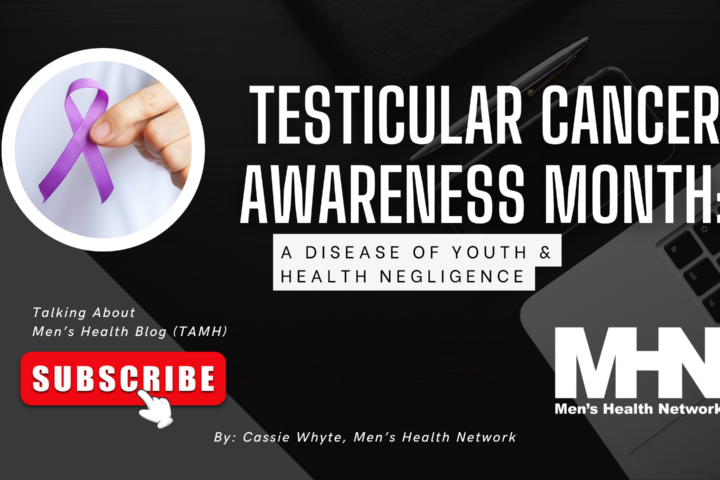National Women’s Health Week, which serves as a reminder for women and girls to make their health a priority, takes place from May 9-15 this year. It is important for all women and girls, especially during the outbreak of COVID-19, to continually take care of themselves and each other.
Starting off the week with Mother’s Day provides the chance for many to remember everything that mothers and maternal figures do for us, from their motherly comfort to their life lessons to their unconditional love. Women are an integral aspect of everyone’s lives, as they’re the ones who remind us to brush our teeth, eat a well-balanced meal, get outside, and express our feelings. All women, whether they are mothers, wives, sisters, or friends, remind us to take care of ourselves, and it’s important that they do the same for themselves.
Men’s Health Network supports the observance of National Women’s Health Week because men value the physical and emotional wellbeing of the many women and girls in their lives. Additionally, women encourage their male counterparts to take care of their mental and physical health. For these reasons, MHN offers a variety of resources targeted to women so that they can better understand and respond to men’s health issues. These sources can be found on the MHN website at https://www.menshealthnetwork.org/women.htm
Led by the Office on Women’s Health (OWH), National Women’s Health Week encourages women and girls to pay close attention to their physical and mental health and take steps to improve it. To be your healthiest self, you can:
• Continue to protect yourself from COVID-19 by wearing a mask that covers your nose and mouth, watching your distance (stay 6 feet apart), washing your hands often, and getting a COVID-19 vaccine when it is available to you.
• When the COVID-19 vaccine is available to you, schedule your appointment and talk to your friends and family about the importance of getting the COVID-19 vaccine.
• To learn more about the COVID vaccine, how to prepare for your vaccine appointment and what to expect, visit: https://go.usa.gov/xHRDu
• You can find locations to receive the vaccine here: https://vaccinefinder.org/search/
• Talk to your doctor, nurse, nurse practitioner, and/or physician assistant:
• about the COVID-19 vaccine and any vaccines that you may have missed during the pandemic;
• about preventive care such as PAP smears, mammograms, bone density scans, stress tests, cholesterol screenings, blood pressure screenings, physical exams, and other preventive health screenings that you may have missed during the pandemic;
• if stress, anxiety, or depression is getting in the way of your daily activities; or • if you have a health condition, such as asthma, diabetes, high blood pressure or obesity, to develop or maintain a plan to keep it under control.
• if your child has missed any recommended check-ups or vaccinations during COVID-19. COVID-19 has caused many disruptions in families’ lives – and in some cases, it has meant that children have missed or delayed their wellness checkups and vaccination, which are a critical part of ensuring children stay healthy. Talk to your child’s doctor to make sure they are on track with routinely recommended vaccinations. If they have missed any vaccinations due to COVID-19, work with your child’s doctor to develop a plan to get caught up.
• Maintain a healthy weight
• Healthy weight is different for everyone but it’s important to know what a healthy weight is for you. Talk to your health provider about what a healthy weight is for you.
• Set realistic goals. Talk to your doctor or nurse about your health goals and ways to achieve them.
• Get and stay active
• Spend time outdoors in the sunshine and be physically active for at least 30 minutes a day.
• Incorporate exercises that build and strengthen your muscles. This is important if you experienced reduced movement or physical activity or if you were hospitalized during the pandemic. All of these may contribute to muscle loss.
• You can get great ideas to get active and create a weekly activity planner through Move Your Way.
• If you are pregnant, there are ways that you can exercise safely but it is important to talk to your doctor before starting or changing your physical activity.
• There is not a “one-size-fits-all” approach to physical activity. Find a routine to fit your needs based on your age, stage of life, and abilities.
• Eat well-balanced meals and snacks
• Heart-healthy eating involves choosing certain foods, such as fruits and vegetables, while limiting others, such as saturated and trans fats and added sugars.
• It’s important to ensure you are getting enough vitamins in your diet, like vitamin D. Good dietary sources of Vitamin D include fortified foods such as milk, yogurt, orange juice, and cereals; oily fish such as salmon, rainbow trout, canned tuna, and sardines; and eggs. Calcium is an important nutrient for your bone health across the lifespan.
• Take care of your mental health
• Stay connected with family and friends.
• Connect with your community- or faith-based organizations.
• Make time to unwind and focus on activities you enjoy.
• Pay attention to changes in your mood
• If you or anyone you know is experiencing changes in thinking, mood, behavior, and/or thoughts of selfharm, reach out for help:
• SAMHSA’s National Helpline – 1-800-662-HELP (4357) • SAMHSA’s National Helpline is a free, confidential, 24/7, 365-day-a-year treatment referral and information service (in English and Spanish) for individuals and families facing mental and/or substance use disorders.
• Seek help if you or someone you know is experiencing domestic violence
• National Domestic Violence Hotline is a 24/7 confidential service that supports victims and survivors of domestic violence. The hotline can be reached:
• By phone: 1-800-799-7233(SAFE)
• By text: Text LOVEIS to 22522
• Online chat: https://www.thehotline.org and select “Chat Now”
• Highly trained, experienced advocates offer support, crisis intervention information, educational services and referral services in more than 200 languages. The website provides information about domestic violence, online instructional materials, safety planning, and local resources.
• Find healthy ways to manage stress.
• As a caregiver, taking care of yourself and getting the help you need are important. Taking care includes maintaining healthy behaviors, managing stress, and seeking extra support, especially during COVID-19.
• Practice good sleep habits to improve your mental and physical health and boost your immune system:
• Follow a routine for going to sleep – be consistent going to bed and getting up – even on weekends.
• Try to get at least 7 hours of sleep.
• Monitor alcohol intake and avoid illicit drugs, including drugs that are not prescribed to you.
• Look out for your lungs
• Quit smoking and vaping.
• Smoking weakens your lungs and puts you at a much higher risk of having serious health complications, especially if you have COVID-19
We know that when it comes to taking steps for better health, it’s not always easy, especially during the current pandemic. Take time this National Women’s Health Week to pause and reflect on your physical and mental health. Ask yourself where you are on your health journey and where you want to go to stay healthy during and after the pandemic. Whether you’re focused on getting outside for regular physical activity, eating healthier, or managing your stress, OWH has tips and resources to help you along the way! For ideas and tips to help you improve your health in a way that works for you, visit www.womenshealth.gov/nwhw. Start working toward your health goals — and share your progress with us using #NWHW and #OWH30.
For more information about National Women’s Health Week, visit www.womenshealth.gov/nwhw and follow the Office on Women’s Health (OWH) on Facebook, Twitter, and Pinterest. Go to https://www.womenshealth.gov/nwhw/tools for additional social media toolkits and factsheets.
Image source: Pexels.com




